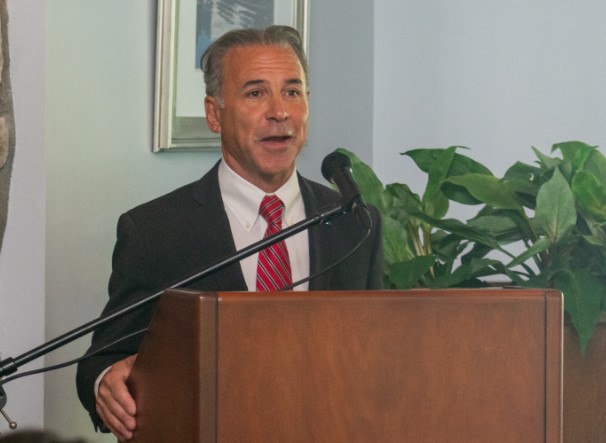Greenwich’s Camillo: ‘I’m working really, really hard on public-private partnerships’

During a Fireside Chat on April 25 that was hosted at the Greenwich Water Club, organized by the town’s Chamber of Commerce and sponsored by First County Bank, Greenwich First Selectman Fred Camillo highlighted his efforts to maintain the aesthetics of the community.
Camillo began by noting that the town stood on firm financial ground and is “one of 16 municipalities that have a AAA credit rating, and we do that despite the restraints we put on ourselves.
One of the reasons why Greenwich has that rating is because we do things in a way that prioritizes everything. Believe me, there are so many projects that I would love personally to see done yesterday, but I know that it has to fall in order.””As you’re probably reading, Central Middle School, that’s number one in the queue,”Camillo added, noting that the town anticipates a $100 million capital budget for the year which will largely go towards rebuilding the school with an anticipated total cost of around $70 million.
The fate of the Old Greenwich School was the next top priority, according to Camillo. He expressed doubts about the immediate viability of major work within the current fiscal year, fearing the final price of renovations will exceed the remaining capital budget. However, Camillo indicated that switching from a 15-year to a five-year capital plan could well provide some of the flexibility needed to execute the plans.
“I’m working really, really hard on public-private partnerships,”Camillo said of a way to provide some movement on key projects within the limits of the capital budget. “If you live in Old Greenwich or go by the Civic Center, you see that going up there. That was over three decades in the making. In 2019 we said that we wanted to do these public-private partnerships and right away one of the first phone calls I got was from Alex Cohen.”A $5 million donation from the Steven & Alexandra Cohen Foundation helped secure funding for the Eastern Greenwich Civic Center which now bears their name.
“That’s the sort of thing that is going to have to happen for projects that lend themselves to naming opportunities,”Camillo said, indicating that high-visibility projects may move faster than other necessary work due to the nature of public-private partnerships. “No one is going to want to donate to a sewer, right?””Low hanging fruit”in the form of beautification projects along Greenwich Avenue, in the Glenville neighborhood and elsewhere in town made the list of projects that the First Selectman told attendees they could look forward to.
Camillo discussed issues with a number of changes made to intersections and roadways across Greenwich which had proved controversial, noting that in many cases these were required to make streets compliant with the Americans with Disabilities Act, even if some landowners resented the need to shovel new walkways in the winter.
This fed into a larger discussion of the balancing act he maintains as first selectman.
“On overdevelopment part of every day is devoted to my talking to state officials, state legislators, advocates, trying to get the state off our back,”Camillo said, describing a constant struggle against 8-30g. 8-30g is a state law which allows affordable housing developments to bypass zoning laws that don’t pertain to health and safety.
Camillo said it was “impossible”for towns in Fairfield County to make 10% of their housing stock affordable, except for the largest cities, adding that level of affordability would prevent developers from invoking 8-30g. Nine Fairfield County towns, including Darien, New Canaan and Westport have earned moratoriums on 8-30g developments granted by the state in response to their efforts to increase their affordable housing stock.
Camillo praised the town for reaching 5.8% affordability through approved projects, and expressed hope that a proposed bill could re-classify existing housing and count towards the total.
Immediately after discussing his daily efforts to oppose “overdevelopment,”Camillo on the other hand urged attendees to keep in touch with their state representatives, “because we can’t take any more out-migration from the state. It has reached crisis levels.”During audience questions, Camillo discussed concerns about parking and acknowledged a shortage of parking spaces that resulted in employees within downtown businesses feeding parking meters for the durations of their shift. To address the issue, he said plans are in the works to lower rates at municipal lots, but that any parking garage would need to be either underground or built into a grade.
“Nobody wants to see a standalone parking structure,”he declared. “They’re ugly and it’s not what people want to see now.”Camillo floated the idea of a subtler parking structure at the Board of Education building, which was proposed in plans in the 1990s. He noted the possibility of a public-private partnership for the project.